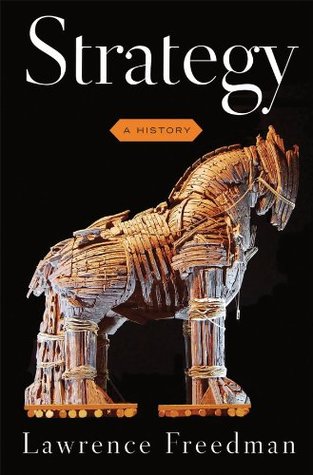More on this book
Community
Kindle Notes & Highlights
There is a call for a strategy every time the path to a given destination is not straightforward or whenever judgments are required on resources needed, their effective application, and their appropriate sequence.
identifying objectives; and about the resources and methods available for meeting such objectives.
success through the application of a superior intelligence, which takes advantage of the boring, ponderous, muscle-bound approach adopted by those who take their superior resources for granted.
References to business strategy were rare before 1960. They started to take off during the 1970s and by 2000 became more frequent than references to military strategy.4 It is through the literature on management and business that the use of the word has spread.
deception and coalition formation, and the instrumental use of violence.
chimpanzees.
Chimps are self-aware, understand others well enough to deceive them, and show gratitude or retribution according to whether the...
This highlight has been truncated due to consecutive passage length restrictions.
Once a goal had been achieved, the patterns of behavior changed—for example, both the winners and losers became less aggressive.
“the roots of politics are older than humanity.”
capacity for empathy.
“essential for the regulation of social interactions, coordinated activity, and cooperation toward shared goals.
Deception
early intellectual challenges facing our ancestors
Working effectively in groups required understanding the particular characters of other members of the groups, how they were ranked in the hierarchy and with whom they had attachments, and what all this might mean in specific situations. Strategies of Violence One important complexity was the need to take on other groups with whom there were no social bonds, what Charles Darwin called “the struggle for existence.” A sense of the potential for cooperation and the limits to conflict might shape social relations within the “in” group, but different imperatives come into play once there is a
...more
This highlight has been truncated due to consecutive passage length restrictions.
Wrangham argued that adult male chimpanzees
They tried to avoid a fight if they were weaker, readily retreating in the face of superior force, but moved in when they were stronger.
and it was especially smart to get others to help overpower opponents.
had a number of advantages.
recognition of the distinctive attributes of individuals
influence their behavior, including by impressing or misleading them.
The most effective strategies do not depend solely on violence—though this can play an instrumental role, by demonstrating superiority as much as expressing aggression—but benefit instead from the ability to forge coalitions. Little in the rest of this book will suggest that this list should be expanded. The elements of strategic behavior have not changed, only the complexity of the situations in which they must be applied.
Diana Lipton has suggested that the Exodus reflected less a concern that the Israelites were being oppressed and more one that they were being seduced by Egyptian life and were in the process of being assimilated.
The favored strategy was coercive,
Threats might fail because they are not believed or are suspected to be bluff.
David’s success depended on surprise and accuracy.
deception became a strong biblical theme.
The man of action could either be admired for his courage or dismissed as a fool for his sole reliance on strength, while the man of words could be celebrated for his intelligence or treated warily because words could deceive.
Achilles and Odysseus,
(strength and cunning),
force and guile.
There was also the more practical problem that reliance on deception was apt to suffer diminishing returns as opponents came to appreciate what they were facing.
Other ways of coping with superior strength, however, were combining with others or disrupting an opponent’s coalition.
The ability to persuade not only one’s people but also allies and enemies was a vital attribute of the successful strategist. In this way, strategy required a combination of words and deeds, and the ability to manipulate them both.
Athena, the goddess of both wisdom and war,
Odysseus exhibited an agile and expedient intelligence. He could evaluate situations quickly, think ahead, and stay sharply focused on the ultimate goal even when caught in ambiguous and uncertain situations.
it became hard to get anyone to believe him, even when he was telling the truth.
Cassandra would make accurate predictions and never be believed.
Homer contrasted mētis with biē, or brute force.
When the offensive began, he went on the rampage, driving the Greeks back. One casualty was Patroclus, a close friend of Achilles.
His death led Achilles to turn his considerable rage away from Agamemnon and
Achilles was soon killed by Paris, the man who had caused the war in the first place by taking Helen from King Menelaus of Sparta.
Brute force is not enough.
Those who knew Odysseus’s reputation rarely trusted
The Athenian War
consisted of ten strategoi who were expected to be able to lead from the front, fight with the best, and show total commitment.
The power and prestige of Athens had grown as a result of its leadership of the successful Greek resistance to Persia,
Sparta would not want to acquire a reputation for weakness or be weakened in practice by the loss of substantial allies. This was what created the crisis for Sparta. To be sure, Corinth portrayed Athens as grasping with limitless hegemonic ambitions. But to the extent Sparta took note of Corinth, it was not because such fears were shared but because of concern about the defection of a key ally.
“If you yield to them you will immediately be required to make another concession which will be greater, since you will have made the first concession out of fear.”23 Even then, there was restraint in his strategy. It put the onus on Sparta to strike the first blow and refuse arbitration.
whose rivalries and entanglements drew in Sparta and Athens.
Athens saw a choice between alliance with Corcyra or seeing its navy being taken by the Peloponnesians;


